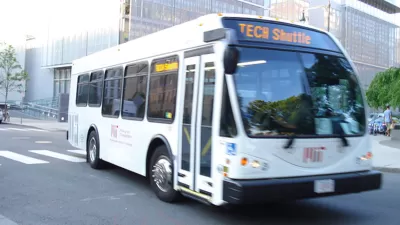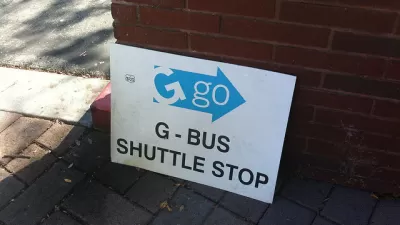A San Francisco Chronicle editorial supports the decision by the Municipal Transportation Agency to 'bow' to complaints from residents about the large tech buses by reducing their stops in their neighborhoods even if it means increasing car trips.

"Bowing to complaints from residents in congested neighborhoods like the Mission, the San Francisco Municipal Transportation Agency has been regulating the stops for the large buses that ferry technology workers to campuses on the Peninsula," editorializes the paper.
Moving shuttle stops from smaller streets onto larger ones will reduce neighborhood congestion and improve quality of life.
Moving the stops by only a few blocks asks tech workers to make only the tiniest of sacrifices.
A post on Monday indicates that "fewer Facebook employees are taking the shuttle and choosing to drive instead—according to a recent Facebook report to the city of Menlo Park."
According to that report, "on May 9, trips entering Facebook’s complex at One Hacker Way increased by about 16 percent to 12,400 compared with May 8 of last year.
"It’s unfortunate that more workers are choosing to drive to work," continues the editorial. "But the fault here is with those workers. It’s not with the city transportation agency."
In other words, blame commuters for resorting to their cars rather than walking up to half a mile to new bus stops after the transportation agency took away their old stops.
The bias against the city's technology workforce that commutes to the Peninsula and South Bay is acknowledged in the editorial's conclusion. About one-third of Facebook’s employees live in San Francisco, according to Wendy Lee's earlier article in The Chronicle.
If there was a bias in this case, it was that the agency chose to weigh more heavily complaints from the San Francisco neighborhoods than the convenience of technology companies who aren’t based within the city’s limits. San Francisco residents are the ones who pay the SFMTA’s bills, so that’s right and fair.
It would seem that the paper overlooks the fact that commuters to Facebook and other tech companies are San Francisco residents as well.
More on how the technology shuttles have reshaped Silicon Valley's workforce here.
FULL STORY: SFMTA has the right compromise on tech buses

Planetizen Federal Action Tracker
A weekly monitor of how Trump’s orders and actions are impacting planners and planning in America.

Maui's Vacation Rental Debate Turns Ugly
Verbal attacks, misinformation campaigns and fistfights plague a high-stakes debate to convert thousands of vacation rentals into long-term housing.

Restaurant Patios Were a Pandemic Win — Why Were They so Hard to Keep?
Social distancing requirements and changes in travel patterns prompted cities to pilot new uses for street and sidewalk space. Then it got complicated.

In California Battle of Housing vs. Environment, Housing Just Won
A new state law significantly limits the power of CEQA, an environmental review law that served as a powerful tool for blocking new development.

Boulder Eliminates Parking Minimums Citywide
Officials estimate the cost of building a single underground parking space at up to $100,000.

Orange County, Florida Adopts Largest US “Sprawl Repair” Code
The ‘Orange Code’ seeks to rectify decades of sprawl-inducing, car-oriented development.
Urban Design for Planners 1: Software Tools
This six-course series explores essential urban design concepts using open source software and equips planners with the tools they need to participate fully in the urban design process.
Planning for Universal Design
Learn the tools for implementing Universal Design in planning regulations.
Heyer Gruel & Associates PA
JM Goldson LLC
Custer County Colorado
City of Camden Redevelopment Agency
City of Astoria
Transportation Research & Education Center (TREC) at Portland State University
Jefferson Parish Government
Camden Redevelopment Agency
City of Claremont




























